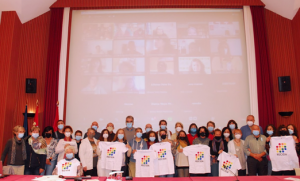Between 6-18 November, roughly 35,000 people are coming together in Sharm El-Sheik, Egypt, for the 2022 UN Climate Change Conference (COP27). IFLA sent a delegation to take part in the first week of the conference which included Dr Marwa El Sahn and Dr Heba Mohamed Ismail, both members of IFLA’s Regional Division for the Middle East and North Africa Committee, as well as Claire McGuire, IFLA Policy and Research Officer. They joined colleagues from the Climate Heritage Network in bringing the voices of culture, heritage, and the arts to COP27.
Below is the transcript of the presentation given by Heba Mohamed Ismail during two events focussing on Action for Climate Empowerment (ACE), or the critical role that enabling all members of society to engage in climate action plays in facing the climate crisis. Heba’s presentation shed light on how libraries in Egypt are already carrying out work that touches on all six elements of ACE: climate change education and public awareness, training, public participation, public access to information, and international cooperation on these issues.
Count Libraries In!
Dr. Heba Mohamed Ismail
IFLA MENA RDC member, IFLA CPDWL SC member, Vice President of Arab Federation for Libraries and Information, Libraries Technical Manager, Egypt’s Society for Culture and Development (ESCD)
Over the past years, libraries across the world have paused to reflect and recommit to a better climate future.
Libraries are institutions in which to turn this commitment into action, as public spaces, as well as champions for access to information and lifelong learning, libraries are well placed within their communities to be hubs and to have a role in Action for climate empowerment.
In this presentation, I will explore examples of what public libraries in Egypt are already doing, and how they have supported the six elements of Action for climate empowerment through their activities
1. Education
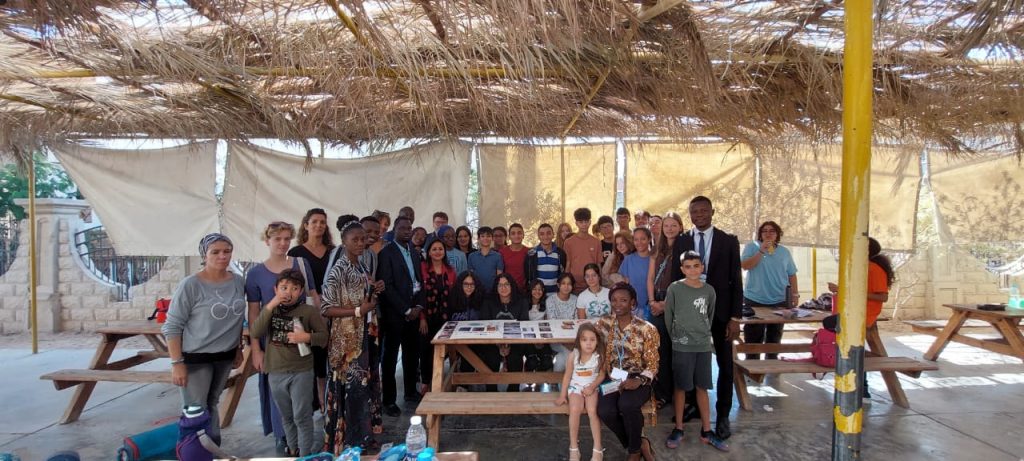
Bibliotheca Alexandrina, in cooperation with Senghor University target francophone students and those who are studying French as a second language. Focusing on arts and games, two workshops were conducting and are tailored to increase the students’ environmental awareness; the understanding of changes in the climate; its impact on the quality of life in general, and our role as active members of society towards environmental issues.
2. Public awareness
These programmes feature activities and events dedicated to raise public awareness and inspiring action
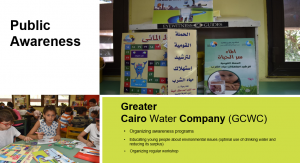
Egypt’s Society for Culture and Development (ESCD) in cooperation with the Greater Cairo Water Company (GCWC)
ESCD is non-profit organization that supervise children and Public libraries in 4 governorates in Egypt
- Organizing awareness programs
- Educating young people about environmental issues (optimal use of drinking water and reducing its surplus)
- Organizing regular workshops
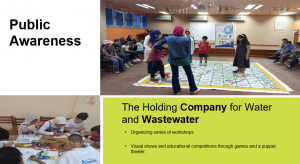
Egypt’s Society for Culture and Development (ESCD) in cooperation with the Holding Company for Water and Wastewater
- Organize a series of workshops
- Offer visual shows, educational competitions through games and a puppet theater
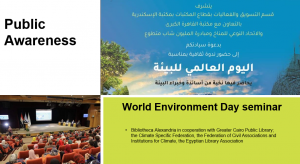
Bibliotheca Alexandria in cooperation with Greater Cairo Public Library; the Climate Specific Federation, the Federation of Civil Associations and Institutions for Climate, the Egyptian Library Association host a World Environment Day Seminar.
The seminar tackles climate changes, their impact on agriculture and livestock production, and the means to address them. It also discusses the methods of rationalizing water consumption, and examines the role of artificial intelligence and civil society organizations in addressing climate changes, with the aim of achieving the goals of sustainable development and Egypt’s vision 2030.
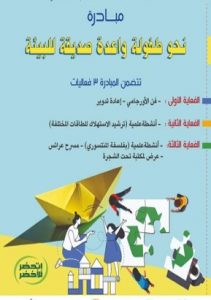 Misr Public Library System (MPL) in cooperation with the Faculty of Early Childhood Education, Cairo University, which is concerned with educating ordinary children and people with special needs, launched an initiative entitled “Towards a promising environmentally friendly childhood.” The initiative includes several activities and events:
Misr Public Library System (MPL) in cooperation with the Faculty of Early Childhood Education, Cairo University, which is concerned with educating ordinary children and people with special needs, launched an initiative entitled “Towards a promising environmentally friendly childhood.” The initiative includes several activities and events:
- workshops conducted by teachers with ordinary children and people with special needs on origami, paper crafts and recycling.
- The second event: held in cooperation with Rotary Egypt, they carry out agricultural activities.
- The third event: includes a variety of activities that the teachers carry out with the children, such as the puppet theater and Montessori activities on rationalizing the consumption of energy, water and electricity, preserving the environment from pollution, and making signs and posters that encourage concern for the environment.
3. Training
Different training were provided to librarians and to students on environmental issues and activities.
4. Public participation
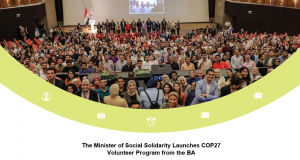
The Bibliotheca Alexandrina witnessed the launching of the volunteer program of the United Nations Climate Change Conference (COP27), Dr. Nevine El-Kabbaj, Minister of Social Solidarity, addressed the volunteers via video conference during their gathering at the Library. and discussed the Ministry’s efforts in preparing around 1300 volunteers to organize the Climate Change Conference.
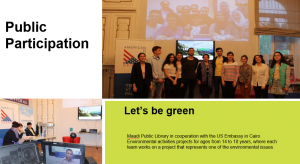
Let’s be green: Maadi Public Library
One of ESCD’s libraries- in Cooperation with the U.S Embassy in Cairo conducted environmental activities within the framework of projects for ages from 14 to 18 years, where each team works on a project that represents one of the environmental issues, including:
Air pollution and climate change; deforestation; ozone layer depletion; water pollution; radioactive contamination and trying to find solutions for these activities.
“Alexandria Climathon for Youth” at the BA
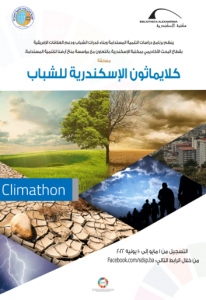 The BA Sustainable Development Studies, Youth Capacity Building, and African Relations Support Program organized “Alexandria Climathon for Youth” competition. “Climathon” is an international competition held in several countries around the world through EIT Climate-KIC, which aims at raising the awareness of urban residents about climate changes. The competition is an opportunity for young people to participate in developing ideas that address local climate challenges. The activities of “Climathon” are held internationally on the same date in hundreds of cities, and are supported by local organizers.
The BA Sustainable Development Studies, Youth Capacity Building, and African Relations Support Program organized “Alexandria Climathon for Youth” competition. “Climathon” is an international competition held in several countries around the world through EIT Climate-KIC, which aims at raising the awareness of urban residents about climate changes. The competition is an opportunity for young people to participate in developing ideas that address local climate challenges. The activities of “Climathon” are held internationally on the same date in hundreds of cities, and are supported by local organizers.
This year’s competition was held in several cities across Egypt, as part of the preparations for the United Nations (COP27). Competitors should make suggestions and propose creative solutions that can help alleviate the consequences of climate change in Alexandria.
5. Access to information:
Establishing green corners in public libraries in cooperation with the Ministry of Environment helps transform the library’s space into a greener and more accessible place for children and encourage students to participate in activities, which grow knowledge of social responsibility and Promote public access to information on climate change and its effects.
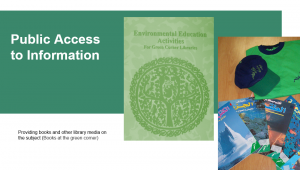
6. International cooperation
Bibliotheca Alexandrina, in cooperation with Senghor University organized an interactive conference (via Zoom) entitled “Yes to Green: Your Right to a Sustainable Future”.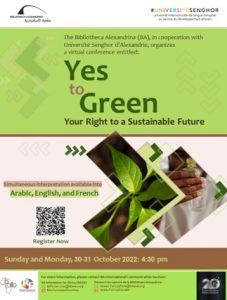
The conference addressed the role of formal and non-formal education in promoting literacy on climate change, as well as the theme of green libraries as a new trend in the world of libraries and information. It will also tackle the projects that have been classified by the International Federation of Library Associations and Institutions (IFLA) as green projects set up in African libraries in Senegal and Kenya.
Additionally, the conference highlighted some of the environmental disasters facing the African continent, together with the role of NGOs and universities in promoting awareness of environmental sustainability. It examined a number of proposed green solutions to address environmental change.
Finally, as climate change is a human-caused problem, human-centred solutions will be key to its successful mitigation. Empowering our communities to develop, participate in, learn about, and embrace these solutions is a powerful way for libraries to enable and drive change.
So count Culture in, Count libraries in, and ACT NOW!
 From 20 to 22 October 2021, the twentieth Seminar of Environmental Documentation Centers and Protected Natural Areas was held. This year it has been coordinated by the National Center for Environmental Education (CENEAM) of the Ministry for the Ecological Transition and the Demographic Challenge and the Center for Documentation and Resources for Environmental Education of Cantabria (CIMA).
From 20 to 22 October 2021, the twentieth Seminar of Environmental Documentation Centers and Protected Natural Areas was held. This year it has been coordinated by the National Center for Environmental Education (CENEAM) of the Ministry for the Ecological Transition and the Demographic Challenge and the Center for Documentation and Resources for Environmental Education of Cantabria (CIMA).